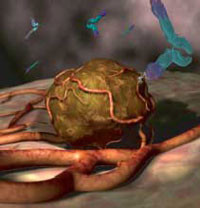Preclinical assessments have demonstrated the similarity of biologicals major Amgen’s biosimilar bevacizumab candidate (ABP 215) to Avastin [1].
Biosimilar bevacizumab similar to Avastin in preclinical assessments
Biosimilars/Research
|
Posted 24/10/2014
 0
Post your comment
0
Post your comment

Bevacizumab is a humanized monoclonal antibody. It inhibits angiogenesis (the formation of new blood vessels) by blocking the action of vascular endothelial growth factor A (VEGF-A). Bevacizumab can therefore slow the growth of new blood vessels in tumours and is used to treat various cancers, including colorectal, lung, breast, glioblastoma, kidney, and ovarian.
The results of the comparative assessment of biological activity were presented at the European Society for Medical Oncology (ESMO) 2014 Congress held in Madrid, Spain, on 26–30 September 2014.
The preclinical assessments included testing of the binding of ABP 215 and Avastin (bevacizumab) to VEGF and VEGF isoforms by surface plasmon resonance and to cell-surface expressed FcRn and to FcgRIIIa by AlphaLISA (amplified luminescent proximity homogeneous assay technology platform). The inhibition of proliferation and VEGFR2 autophosphorylation was compared in human umbilical vein endothelial cells. Anti-tumour activity was compared in A431 and Colo205 tumour xenograft models.
Results of assessments showed similarity between Amgen’s biosimilar candidate (ABP 215) and Avastin in terms of equilibrium binding affinity to VEGF (ABP 215: 117 pM and Avastin: 112 pM, binding to VEGF165 and VEGF121, binding to FcRn (ABP 215: 95–102%, Avastin: 114–127%), binding to FcgRIIIa (ABP 215: 100–115%, Avastin: 100–105%. Potency in proliferation inhibition was found to be similar across three lots each of Avastin (87–98%) compared to ABP 215 (92–101%). Inhibition of autophosphorylation (IC50) was also found to be similar for a single lot each of ABP 215 (0.0871 µg/mL) compared to Avastin (0.0858 µg/mL). The effects of ABP 215 and bevacizumab were also similar in vivo, in terms of inhibition of both tumour growth and tumour-associated vasculature in A431 and Colo205 models.
The authors therefore concluded that ‘ABP 215 appears to be highly similar to bevacizumab in multiple sensitive preclinical pharmacologic assessments’.
Amgen is already carrying out a phase III trial to evaluate the efficacy and safety of ABP 215 compared with Avastin in subjects with advanced non-small cell lung cancer [2]. The trial, which is being carried out in 121 sites around the globe, is expected to be completed by September 2015.
Conflict of interest
The authors of the abstract [1] are stockholders and employees of Amgen.
Editor’s comment
It should be noted that this study was published as an abstract and presented at a conference. These data and conclusions should be considered to be preliminary until published in a peer reviewed journal.
Related articles
Biosimilars collaboration at Amgen and Actavis
Amgen, Hospira & Sandoz set to dominate US biosimilars market
References
1. Born TL, Huynh Q, Mathur A, et al. Functional similarity assessment results comparing bevacizumab to biosimilar candidate ABP 215. Ann Oncol. 2014; 25(4):163. Abstract 489P.
2. GaBI Online - Generics and Biosimilars Initiative. Biosimilars of bevacizumab [www.gabionline.net]. Mol, Belgium: Pro Pharma Communications International; [cited 2014 Oct 24]. Available from: www.gabionline.net/Biosimilars/General/Biosimilars-of-bevacizumab
Permission granted to reproduce for personal and non-commercial use only. All other reproduction, copy or reprinting of all or part of any ‘Content’ found on this website is strictly prohibited without the prior consent of the publisher. Contact the publisher to obtain permission before redistributing.
Copyright – Unless otherwise stated all contents of this website are © 2014 Pro PharmaCommunications International. All Rights Reserved.
News
FDA approves Poherdy (first interchangeable pertuzumab) and Armlupeg (pegfilgrastim) biosimilars
EMA recommends approval for insulin glargine biosimilar Ondibta and denosumab biosimilar Osqay
General
Samsung Bioepis wins Pyzchiva case; Regeneron patent rulings threaten foreign biosimilars
Chinese biosimilars go global: growth, partnerships, and challenges
What is the future for the US biosimilar interchangeability designation

Biosimilars/Research Posted 05/06/2025
Biosimilar clinical efficacy studies: are they still necessary?

Biosimilars/Research Posted 27/05/2025
The best selling biotechnology drugs of 2008: the next biosimilars targets








Post your comment